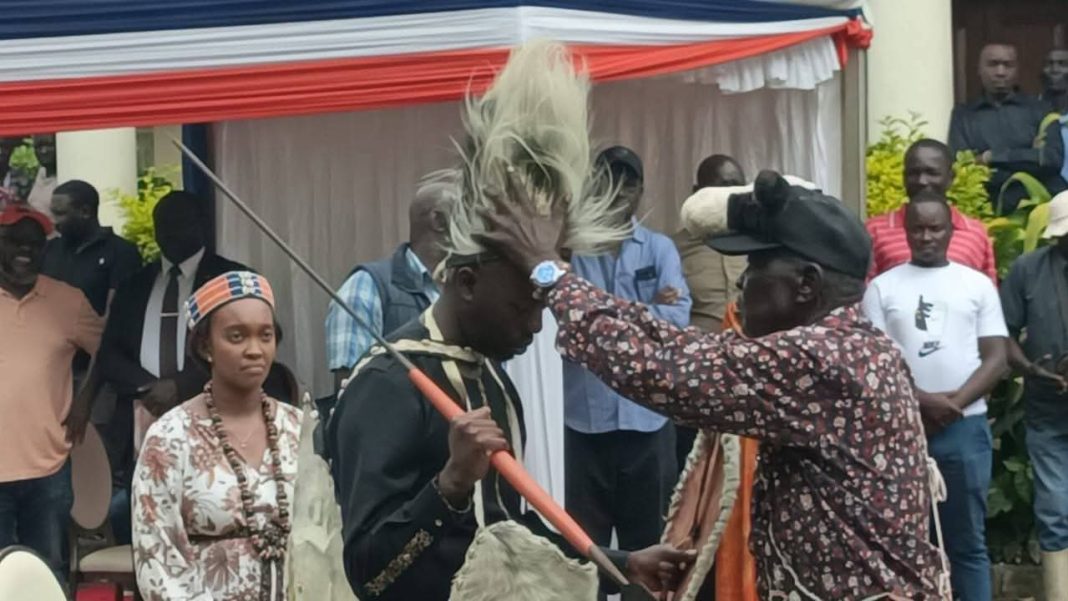By James Okoth
In the quiet homestead of Kang’o Ka Jaramogi, history turned its next page. Beneath the soft Bondo sun, family elders gathered in solemn reflection as they performed a rite steeped in Luo tradition, installing Raila Odinga Junior as the new head of the Odinga family.
It was not a political coronation, but a deeply symbolic act of continuity. The mantle that once rested upon Jaramogi Oginga Odinga, and later upon Raila Amolo Odinga, now rests upon Junior, the bearer of a name that has for generations been intertwined with Kenya’s conscience.
The Odinga name has never belonged to one man alone. It is a narrative stretching from the dawn of independence to the dawn of multiparty democracy, from detention cells to state banquets, from protest chants to presidential handshakes. It is a name that has carried both the burden and the blessing of history. In the stillness of Bondo, that legacy was renewed, not through slogans or applause, but through the timeless rhythm of tradition.
When Jaramogi defied the colonial order and later the founding government, he did so in the name of principle. When Raila rose to challenge injustice and fight for democracy, he too acted in the spirit of his father — to resist, to reform, to redeem. Together, the two men defined what it meant to live a life of service and sacrifice. Yet, as Raila’s long political chapter closed with his passing, the Odinga family found itself at a crossroads. The lineage that had influenced Kenya’s destiny for six decades needed a new custodian, one who could preserve its unity, purpose, and dignity.
Fidel Odinga, the first-born son and once presumed heir to the family mantle, departed far too soon. His death left a silence that time never fully healed. Now, a decade later, Raila Junior steps into a role that blends tradition with responsibility. His installation as family head is both an acknowledgment of lineage and a renewal of duty. It signals that the Odinga name, even in grief, remains anchored in order.
The ceremony carried layers of meaning beyond the homestead. To the Luo community, it reaffirmed the importance of continuity — that a great house must never stand without a leader. To Kenya, it was a quiet assurance that the ideals the Odingas have stood for, including justice, fairness and courage, will endure even as politics changes form.
Junior’s role is not to fill his father’s shoes, but to safeguard the ground on which those shoes once stood.
Those close to the family describe him as calm, reflective, and pragmatic. He speaks little but listens deeply. His interests lean toward entrepreneurship, governance, and social transformation rather than the traditional theatre of politics. Yet in his tone and temperament, many see glimpses of both Jaramogi’s intellect and Raila’s resilience. He may never replicate their paths, but he embodies their principles — a quiet defiance, a steady moral compass and a belief in the collective good.
Unlike his father, Junior is not stepping onto the rally stage or into the political storm. His first responsibility lies at home, holding together a large and influential family, ensuring unity and maintaining the honor associated with the Odinga name. But the symbolism of his new role stretches far beyond family walls. In a nation where political families often fracture after the fall of their patriarchs, Junior’s emergence is a sign of stability. It suggests that while the political era of Raila may have ended, the Odinga story continues not through political offices, but through stewardship, reflection and tradition.
The installation also marks a generational shift in how legacy is understood. Kenya’s political landscape is changing rapidly and so are the expectations of leadership. Where once leadership meant fiery rallies and defiant speeches, today it leans toward dialogue, empathy and innovation. Junior represents this transition. He carries the Odinga torch not as a weapon, but as a lamp.
For a family long defined by resistance, this moment feels like an exhale after decades of battle. Raila Odinga’s life was a long road of unfinished dreams — devolution still imperfect, justice still elusive, equality still deferred. Junior inherits not the triumphs, but the unfinished work, reframed through a generational lens.
His task is to preserve the essence of what his father and grandfather stood for, while allowing the family and perhaps the nation, to heal from the exhaustion of constant political combat.
As dusk fell over Bondo that evening, there was a sense of peace in the air — a feeling that the storm had passed, and that the Odinga story had entered its gentlest chapter yet. The revolution that began with Jaramogi and roared through Raila may now find its calm in Junior, a leader not of rallies but of remembrance, not of ambition but of balance.
For Kenya, his installation is both a farewell and a beginning…a reminder that even the fiercest political fires eventually give way to light and in that light, Raila Odinga Junior now stands, the heir to a house of history, the custodian of a name that still whispers to the soul of a nation.




